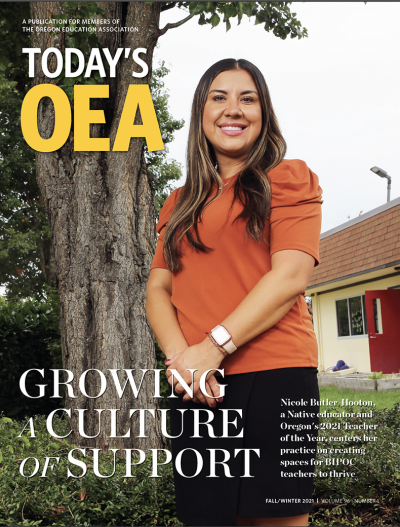Overview
The U.S. Department of Education approved Oregon’s Consolidated Plan Under the Every Student Succeeds Act on Aug. 30, 2017. The Oregon Department of Education is now moving forward implementing the state plan.
Oregon’s plan outlines four opportunities to strengthen and shape Oregon’s educational system:
- Prioritizing and advancing equity
- Extending the promise of a well-rounded education
- Strengthening district systems
- And fostering ongoing engagement
The Oregon plan can be found on the Oregon Department of Education website under “Current Topics” on the home page.
As Oregon moves forward implementing the new plan and undoing many of the systems of No Child Left Behind, there are several areas where educators can get involved at the school, district, or state level; organize locally with colleagues and the community; and influence key decisions affecting students.
Educator Support and Evaluation Systems
The rules for Senate Bill 290, the law governing educator evaluations, were revised in May 2017. Some significant changes were made.
Educators are no longer required to use results from the Smarter Balanced Assessment to measure Student Learning and Growth goals. While this had been guidance for the past two years, it is now officially in rule and no longer just guidance.
Additionally, the use of the Oregon Matrix is also no longer required for determining a summative rating for educators. OEA members and staff were instrumental in making these changes and will continue to work with ODE and other stakeholders in 2017-18 to write guidance for school districts on how to define excellent and ineffective teaching, which is required by ESSA.
These changes to Oregon’s system mark an excellent opportunity for local associations to collaborate with district leaders to reexamine local evaluation and support systems and build a system that is collaborative and focused on support and professional learning, not punishment.
For more information and for official ODE documentation, visit the Educator Effectiveness section of the ODE website.
These changes to Oregon’s system mark an excellent opportunity for local associations to collaborate with district leaders to reexamine local evaluation and support systems and build a system that is collaborative and focused on support and professional learning, not punishment.
School Improvement
This October, ODE will preliminarily identify schools for Comprehensive or Targeted Support and Improvement (CSI and TSI) using Oregon’s new accountability system. This new system replaces the Priority and Focus school designations.
The new Oregon accountability indicators are outlined in the table at right.
The school improvement timeline is as follows:
- Fall 2017: Preliminary identification and local data review
- Winter 2018: Schools and districts complete a comprehensive needs assessment and resource equity review, and work on local school improvement plans
- Spring 2018: Districts determine how to implement and monitor plans
- Fall 2018: Official identification of schools occurs
ODE is emphasizing stakeholder engagement and collaboration, local data reviews, and plans that reflect the local context and needs of individual schools vs. a one-size-fits-all approach. Further, ESSA guarantees educators a critical voice in creating, implementing, and monitoring school improvement plans.
This is a tremendous opportunity for members to get involved at the school level because educators in schools are best-equipped to make decisions about their students.
Oregon School Report Cards
Oregon is redesigning its school report card to reflect the new accountability system, changes mandated by ESSA, and flexibility allowed under ESSA. ODE is currently seeking feedback on the report card redesign from educators, families, and community members.
We encourage all members to take the survey and weigh in on this important public document.
The Accountability work group, which includes OEA members and staff, will review input from the survey and other stakeholder groups this year, and the new report card will be used in 2018-19.
Assessment & Standards
ODE announced in May that it released a Request for Information (RFI) to consider a statewide high school assessment other than Smarter Balanced. ODE has not announced the results of the RFI yet. In July, ODE announced it had successfully worked with Oregon’s test vendor — AIR — to streamline the Smarter Balanced Assessment in ELA and math for grades 3-8 shortening the ELA test by about one hour. The math assessment will also see a slight reduction.
OEA continues to advocate for a more balanced system of assessment placing less emphasis on the statewide summative assessment, and more emphasis on classroom assessments that provide relevant and timely information to students and teachers. OEA is also partnering with ODE to deepen assessment literacy through a community of practice.
Additionally, ODE will begin reconvening educator-led content panels to examine content standards, instructional materials, and assessments. OEA will publicize these opportunities for members interested in engaging in this work. Educators can also sign up to receive the monthly Education Update from the department under the About Us tab on the ODE home page. This monthly newsletter includes information on content panels, and education in Oregon in general.
Questions? Email oea-essa@oregoned.org and check out www.oregoned.org/essa.

